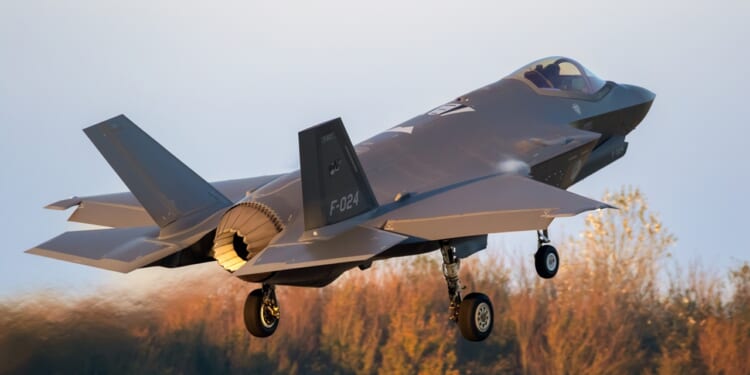For years, the United States has balked at F-35 sales to Arab nations to preserve Israel’s “qualitative military edge”—but these concerns have lessened over the past half-decade.
During President Donald Trump’s first term, the United States sought to close a deal with the United Arab Emirates (UAE) that would have seen the Middle Eastern state acquire the Lockheed Martin F-35 Lightning II. That deal collapsed during the Biden administration, but now another Gulf state could become the first to receive the F-35.
Rather than the UAE, however, that nation could be Saudi Arabia, which has made clear its intention to buy as many as four dozen of the fifth-generation stealth fighters. Reuters first reported on Tuesday that “a potential multi-billion-dollar deal … has cleared a key Pentagon hurdle ahead of a visit by Crown Prince Mohammed bin Salman.”
The news agency cited two sources familiar with the matter, but was unable to provide additional details.
Saudi Arabia Tries the “Art of the Deal”
Saudi Arabia—which currently allocates an astounding 8.1 percent of its gross domestic product (GDP) to defense—remains the largest buyer of American military hardware in the world. Riyadh has sought a fifth-generation fighter for several years as it seeks to further modernize its air force. It currently operates the F-15 Eagle, including the F-15SA variant, along with the Eurofighter Typhoon and older aircraft, notably the Panavia Tornado.
During the Biden Administration, there was speculation that a deal could be reached as a pathway to Riyadh normalizing relations with Israel. Those efforts were concluded and remained stalled during the war in Gaza.
President Trump may seek to build on the Abraham Accords, which led to the UAE and Bahrain, followed by Morocco, formally normalizing relations with the Jewish state.
In May, Washington closed an arms deal with Riyadh valued at nearly $142 billion, which the White House said was the “largest defense cooperation agreement” involving the United States.
The package included a variety of military equipment and services across five main categories: air force and space, air and missile defense, maritime and coastal security, border security and land forces modernization, and information and communication systems.
Not included, however, was the F-35 Lightning II.
A key sticking point would likely be Congress, and some lawmakers previously objected to arms deals with Saudi Arabia following the 2018 murder of Saudi journalist Jamal Khashoggi.
Israel’s “Qualitative Military Edge” Remains an Issue
A key sticking point in any deal involving the F-35 is maintaining Israel’s “qualitative military edge” (QME). At present, Israel is currently the only Middle Eastern operator of the F-35. The Israeli government initially objected to the proposed sale of the Lightning II to the UAE, but later relented after the Arab country normalized relations with it in the Abraham Accords. The eventual sale stalled for other reasons, notably the UAE’s use of Chinese technology.
The United States has long maintained a policy of ensuring Israel’s QME over its neighbors—even countries such as Jordan and Egypt, both of which have formally recognized Israel.
The Jewish state’s security doctrine has long prioritized qualitative superiority over neighbors and possible rivals, and for good reason. Israel has long grappled with the possibility that today’s friends could be tomorrow’s enemies—with Iran, which enjoyed friendly relations with the Jewish state prior to 1979, being such an example.
Many Arab States Want the F-35
Saudi Arabia isn’t the only nation besides the UAE that has expressed interest in the F-35. Egypt, Bahrain, and Morocco have also made clear that they would seek to adopt the aircraft if that were an option. Morocco, which has also normalized relations with Israel, is likely to encounter the least resistance from Israel, given the distance between the two.
Rabat first began talks to buy the F-35 in 2020 and moved forward a year later following high-level meetings between Moroccan Defense Minister Abdellatif Loudiyi and Israeli Defense Minister Benny Gantz. These efforts slowed in 2022, but picked up steam again last year as the news circulated that regional rival Algeria was moving towards a deal with Russia for the Sukhoi Su-57 (NATO reporting name “Felon”).
In this case, the United States may not want a Russian partner to maintain its own qualitative military edge over one of Washington’s regional allies!
About the Author: Peter Suciu
Peter Suciu has contributed over 3,200 published pieces to more than four dozen magazines and websites over a 30-year career in journalism. He regularly writes about military hardware, firearms history, cybersecurity, politics, and international affairs. Peter is also a contributing writer for Forbes and Clearance Jobs. He is based in Michigan. You can follow him on Twitter: @PeterSuciu. You can email the author: [email protected].
Image: Shutterstock / VanderWolf Images.
















